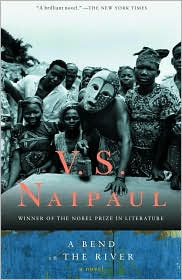A Bend in the River, by V. S. Naipaul
 I have the greatest trouble finding something to say about the books I really like. I did just buy as much Naipaul as Powells would sell me, so maybe I'll get another few cracks at him soon, but we'll see what I can scratch out here.
I have the greatest trouble finding something to say about the books I really like. I did just buy as much Naipaul as Powells would sell me, so maybe I'll get another few cracks at him soon, but we'll see what I can scratch out here.I suppose what appeals to me about Naipaul, and about this book, is simply its unerring sense of order, and its belief that order is not the antithesis of complexity. It takes the most bewildering forms of cultural and political disorganization—diasporas, failed states, state-sponsored violence, "free" markets—and organizes them without any attempt to contain or simplify them, and without transmogrifying them into symbols or metaphors. There is symbolism (some characters, as you'll shortly see, are even quite fond of it), but it isn't the plane of action or even of thought within the novel. A Bend in the River opens with the quote which Patrick French would turn into the title of Naipaul's biography: "The world is what it is." And that is, inconceivably, what you get in this book.
That is not to say that I believe Naipaul can substitute for sociological, historical, or political analyses, or that his artistic truths are identical to the truths such analyses might generate, and that substitutions can be made. And I do not mean to suggest that Naipaul is the grittiest of realists; he is vigilant about details, but he seems blessedly superior to any anxiety about le mot juste, and verisimilitude seems to be less an aesthetic endeavor than a conceptual one.
The point is, everything works: there is a wholeness and consistency to Naipaul's vision that is absolutely formidable, as if the novel wasn't even written on anything so discrete and serial as the page (and I don't mean that it was written Kerouac-style on a scroll).
As I said, I have difficulty finding adequate terms for praising books I really like, and I think I'd like to wait on any kind of exegesis of the book until I've read more of Naipaul's work. So I'll just leave you with this passage. Naipaul describes a sort of etiology for jetlag, which has been done numerous times (I think I can recall a passage about it as recently as Netherland), but it quickly turns :
Indar said, "I didn't want to go back. Not the first time. I didn't think my heart could stand it. But the airplane is a wonderful thing. You are still in one place when you arrive at the other. The airplane is faster than the heart. You arrive quickly and you leave quickly. You don't grieve too much. And there is something else about the airplane. You can go back many times to the same place. And something strange happens if you go back often enough. You stop grieving for the past. You see that the past is something in your mind alone, that it doesn't exist in real life. You trample on the past, you crush it. In the beginning it is like trampling on a garden. In the end you are just walking on ground. That is the way we have to learn to live now. The past is here." He touched his heart. "It isn't there." And he pointed at the dusty road.
Comments
I know what you mean, and I think it's this quality that makes Naipaul hard to assess properly without reducing the work to sociology. There are plenty of experts on the issues connected to his subject matter, but his art is very elusive. In his best work, a masterful artlessness--so confident in his powers of representation that he doesn't stoop to showy effects of any sort--allows him to create an illusion of organic wholeness, as if these complex narratives are everywhere already alive in the world and narrators need only cut through the surrounding tangle to find them and free them.
Sunil, I suppose I tended to think of the novel less as a pastiche than as something that is so expansive that it naturally includes a great deal of disparate matter, but perhaps those things aren't really very different? I really like what you say about the different characters, although for me the experience of Salim's constant presence was absolutely overwhelming (in a good way)--it wasn't that he crowded out the other characters or interfered with my access to them, but that as if I always wanted to compare notes with him about their ways and ideas, if that makes sense.